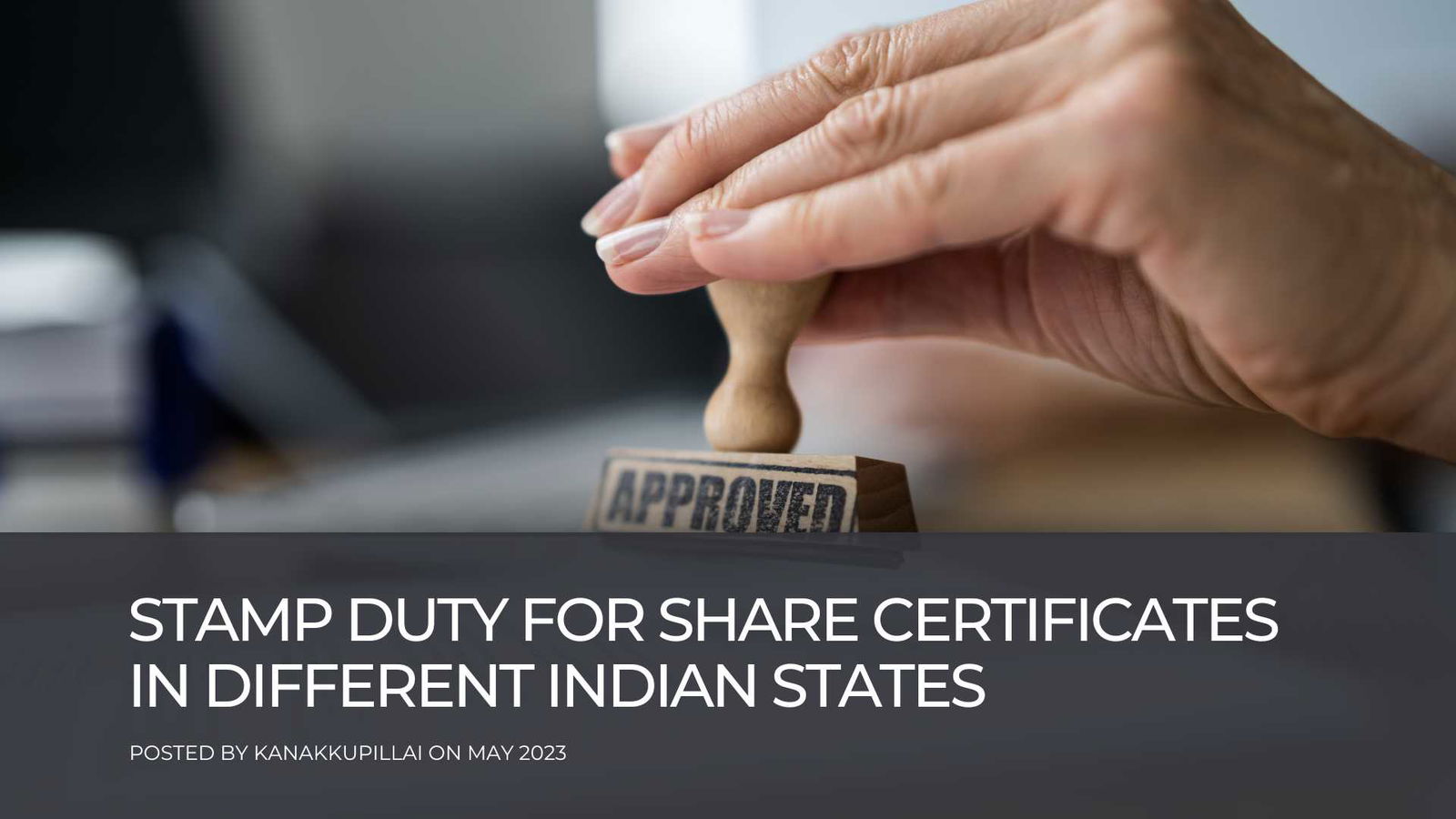Stamp Duty for Share Certificates
When issuing share certificates in India, it is essential to consider the applicable stamp duty. Stamp duty is a tax state governments impose on various documents, including share certificates. The amount of stamp duty varies across different states and is calculated based on the value of the shares, including any premium. This article will provide an overview of the stamp duty rates for share certificates in different Indian states.
Andhra Pradesh:
In Andhra Pradesh, the stamp duty for each share certificate is ₹0.30.
Arunachal Pradesh:
The stamp duty for each share certificate in Arunachal Pradesh is ₹5.00.
Assam:
The stamp duty for share certificates issued in Assam is ₹5.00 per certificate.
Bihar:
Bihar imposes a stamp duty of ₹10.00 for each share certificate.
Chhattisgarh:
In Chhattisgarh, the stamp duty for share certificates is ₹10.00 per certificate.
Goa:
The stamp duty for share certificates issued in Goa is ₹10.00 per certificate.
Gujarat:
In Gujarat, the stamp duty is calculated as ₹1.00 for every ₹1000 or a part thereof of the value of the shares, including any premium.
Haryana:
Haryana levies a stamp duty of ₹0.40 for each share certificate. Additionally, a revenue stamp worth ₹1.00 can be affixed.
Himachal Pradesh:
The stamp duty for share certificates in Himachal Pradesh is ₹0.40 per certificate. Similar to Haryana, a revenue stamp of ₹1.00 can be affixed.
Jammu & Kashmir (J&K):
Jammu & Kashmir imposes a stamp duty of ₹1.00 for every ₹1000 or a part thereof of the value of the shares, including any premium.
Jharkhand:
For share certificates issued in Jharkhand, the stamp duty is ₹1.00 per certificate.
Karnataka:
In Karnataka, the stamp duty is calculated as ₹1.00 for every ₹1000 or a part thereof of the value of the shares, including any premium.
Kerala:
The stamp duty in Kerala is ₹1.00 for every ₹1000 or a part thereof of the value of the shares, including any premium.
Madhya Pradesh:
In Madhya Pradesh, the stamp duty is calculated as ₹1.00 for every ₹1000 or a part thereof of the value of the shares, including any premium.
Maharashtra:
Maharashtra follows a stamp duty rate of 0.1% of the value of the shares (₹1 for every ₹1000), including any premium.
Manipur:
For share certificates issued in Manipur, the stamp duty is ₹5.00 per certificate.
Meghalaya:
In Meghalaya, the stamp duty for each share certificate is ₹2.00.
Mizoram:
Mizoram imposes a stamp duty of ₹1.00 for every ₹1000 or a part thereof of the value of the shares, including any premium.
Nagaland:
For share certificates issued in Nagaland, the stamp duty is ₹0.45 for every ₹1000 or a part thereof of the value of the shares, including any premium.
Odisha (Orissa):
In Odisha, the stamp duty for each share certificate is ₹1.00.
Punjab:
Punjab imposes a stamp duty of ₹10.00 for each share certificate.
Rajasthan:
In Rajasthan, the stamp duty is calculated as ₹1.00 for every ₹1000 or a part thereof of the value of the shares, including any premium.
Tamil Nadu:
In Tamil Nadu, the stamp duty for share certificates is calculated at a rate of ₹1.00 for every ₹1000 or a part thereof of the total value of the shares, including any premium amount.
Telangana:
In Telangana, the stamp duty for each share certificate is fixed at ₹10.00.
Tripura:
In Tripura, the stamp duty for each share certificate is set at ₹5.00.
Uttar Pradesh:
In Uttar Pradesh, the stamp duty for each share certificate is levied at ₹1.00.
Uttarakhand:
In Uttarakhand, the stamp duty for each share certificate is charged at ₹1.00.
West Bengal:
In West Bengal, the stamp duty for each share certificate is calculated at ₹0.60.





